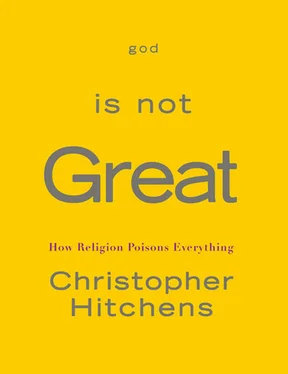“Free will,” reply the casuists. You do not have to obey the laws against murder or theft either. Well, one may be genetically programmed for a certain amount of aggression and hatred and greed, and yet also evolved enough to beware of following every prompting. If we gave in to our every base instinct every time, civilization would have been impossible and there would be no writing in which to continue this argument. However, there can be no question that a human being, whether standing up or lying down, finds his or her hand resting just next to the genitalia. Useful no doubt in warding off primeval aggressors once our ancestors decided to take the risk of going erect and exposing the viscera, this is both a privilege and a provocation denied to most quadrupeds (some of whom can compensate by getting their mouths to the same point that we can reach with our fingers and palms). Now: who devised the rule that this easy apposition between the manual and the genital be forbidden, even as a thought? To put it more plainly, who ordered that you must touch (for other reasons having nothing to do with sex or reproduction) but that you also must not ? There does not even seem to be any true scriptural authority here, yet almost all religions have made the prohibition a near-absolute one.
ONE COULD WRITE AN ENTIRE BOOK that was devoted only to the grotesque history of religion and sex, and to holy dread of the procreative act and its associated impulses and necessities, from the emission of semen to the effusion of menstrual blood. But a convenient way of condensing the whole fascinating story may be to ask one single provocative question.
CHAPTER SIXTEEN
Is Religion Child Abuse?
“Tell me straight out, I call on you—answer me: imagine that you yourself are building the edifice of human destiny with the object of making people happy in the finale, of giving them peace and rest at last, but for that you must inevitably and unavoidably torture just one tiny creature, that same child who was beating her chest with her little fist, and raise your edifice on the foundation of her unrequited tears—would you agree to be the architect on such conditions? Tell me the truth.”
—IVAN TO ALYOSHA IN
THE BROTHERS KARAMAZOV
When we consider whether religion has “done more harm than good”—not that this would say anything at all about its truth or authenticity—we are faced with an imponderably large question. How can we ever know how many children had their psychological and physical lives irreparably maimed by the compulsory inculcation of faith? This is almost as hard to determine as the number of spiritual and religious dreams and visions that came “true,” which in order to possess even a minimal claim to value would have to be measured against all the unrecorded and unremembered ones that did not. But we can be sure that religion has always hoped to practice upon the unformed and undefended minds of the young, and has gone to great lengths to make sure of this privilege by making alliances with secular powers in the material world.
One of the great instances of moral terrorism in our literature is the sermon preached by Father Arnall in James Joyce’s Portrait of the Artist as a Young Man . This disgusting old priest is readying Stephen Dedalus and his other young “charges” for a retreat in honor of Saint Francis Xavier (the man who brought the Inquisition to Asia and whose bones are still revered by those who choose to revere bones). He decides to impress them with a long and gloating account of eternal punishment, of the sort which the church used to mandate when it still had the confidence to do so. It is impossible to quote the entire rant, but two particularly vivid elements—concerning the nature of torture and the nature of time—are of interest. It is easy to see that the priest’s words are designed precisely to frighten children. In the first place, the images are themselves childlike. In the torture section, the very devil himself makes a mountain shrivel like wax. Every frightening malady is summoned, and the childlike worry that this pain might go on forever is deftly played upon. When it comes to the picture of a unit of time, we see a child on the beach playing with grains of sand, and then the infantile magnification of units (“Daddy, what if there were a million million million squillion kittens: would they fill up the whole world ?”), and then, adding further multiplicities, the evocation of nature’s leaves, and the easily conjured fur and feathers and scales of the family pet. For centuries, grown men have been paid to frighten children in this way (and to torture and beat and violate them as well, as they also did in Joyce’s memory and the memory of countless others).
The other man-made stupidities and cruelties of the religious are easy to detect as well. The idea of torture is as old as the nastiness of mankind, which is the only species with the imagination to guess what it might feel like when imposed upon another. We cannot blame religion for this impulse, but we can condemn it for institutionalizing and refining the practice. The museums of medieval Europe, from Holland to Tuscany, are crammed with instruments and devices upon which holy men labored devoutly, in order to see how long they could keep someone alive while being roasted. It is not needful to go into further details, but there were also religious books of instruction in this art, and guides for the detection of heresy by pain. Those who were not lucky enough to be allowed to take part in the auto-da-fé (or “act of faith,” as a torture session was known) were permitted free rein to fantasize as many lurid nightmares as they could, and to inflict them verbally in order to keep the ignorant in a state of permanent fear. In an era where there was little enough by way of public entertainment, a good public burning or disembowelment or breaking on the wheel was often as much recreation as the saintly dared to allow. Nothing proves the man-made character of religion as obviously as the sick mind that designed hell, unless it is the sorely limited mind that has failed to describe heaven—except as a place of either worldly comfort, eternal tedium, or (as Tertullian thought) continual relish in the torture of others.
Pre-Christian hells were highly unpleasant too, and called upon the same sadistic ingenuity for their invention. However, some of the early ones we know of—most notably the Hindu—were limited in time. A sinner, for example, might be sentenced to a given number of years in hell, where every day counted as 6,400 human years. If he slew a priest, the sentence thus adjusted would be 149,504,000,000 years. At this point, he was allowed nirvana, which seems to mean annihilation. It was left to Christians to find a hell from which there was no possible appeal. (And the idea is easily plagiarized: I once heard Louis Farrakhan, leader of the heretical black-only “Nation of Islam,” as he drew a hideous roar from a mob in Madison Square Garden. Hurling spittle at the Jews, he yelled, “And don’t you forget—when it’s God who puts you in the ovens, it’s FOREVER!”)
The obsession with children, and with rigid control over their upbringing, has been part of every system of absolute authority. It may have been a Jesuit who was first actually quoted as saying, “Give me the child until he is ten, and I will give you the man,” but the idea is very much older than the school of Ignatius Loyola. Indoctrination of the young often has the reverse effect, as we also know from the fate of many secular ideologies, but it seems that the religious will run this risk in order to imprint the average boy or girl with enough propaganda. What else can they hope to do? If religious instruction were not allowed until the child had attained the age of reason, we would be living in a quite different world. Faithful parents are divided over this, since they naturally hope to share the wonders and delights of Christmas and other fiestas with their offspring (and can also make good use of god, as well as of lesser figures like Santa Claus, to help tame the unruly) but mark what happens if the child should stray to another faith, let alone another cult, even in early adolescence. The parents will tend to proclaim that this is taking advantage of the innocent. All monotheisms have, or used to have, a very strong prohibition against apostasy for just this reason. In her Memories of a Catholic Girlhood , Mary McCarthy remembers her shock at learning from a Jesuit preacher that her Protestant grandfather—her guardian and friend—was doomed to eternal punishment because he had been baptized in the wrong way. A precociously intelligent child, she would not let the matter drop until she had made the Mother Superior consult some higher authorities and discover a loophole in the writings of Bishop Athanasius, who held that heretics were only damned if they rejected the true church with full awareness of what they were doing. Her grandfather, then, might be sufficiently unaware of the true church to evade hell. But what an agony to which to subject an eleven-year-old girl! And only think of the number of less curious children who simply accepted this evil teaching without questioning it. Those who lie to the young in this way are wicked in the extreme.
Читать дальше












